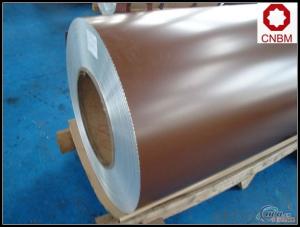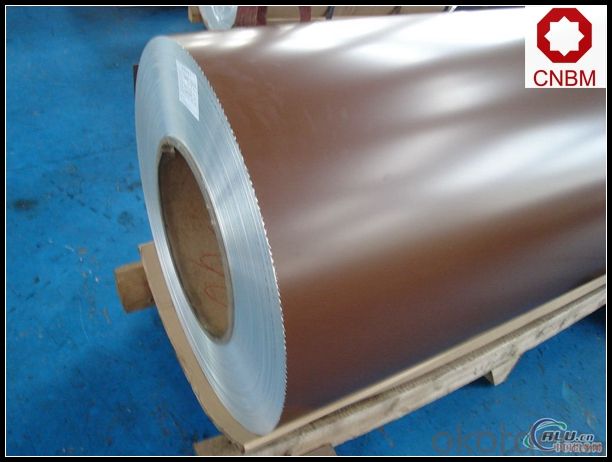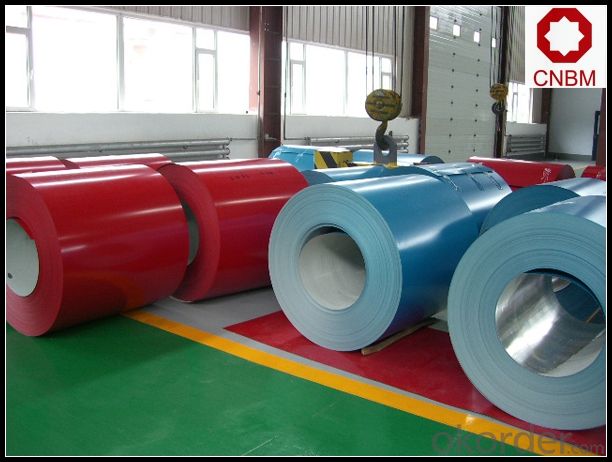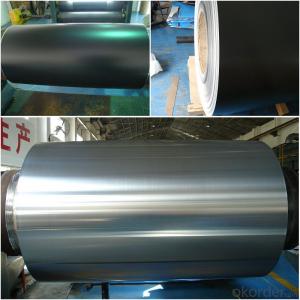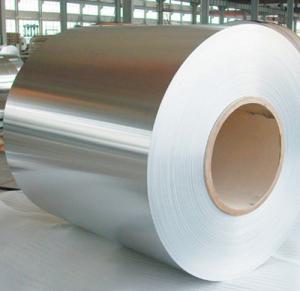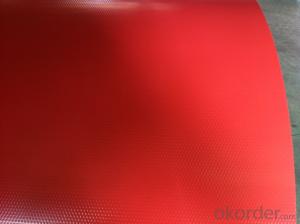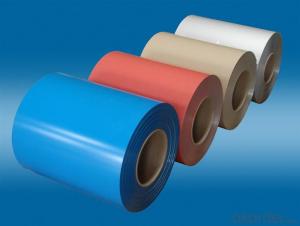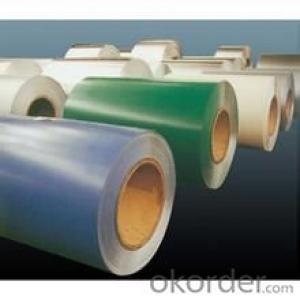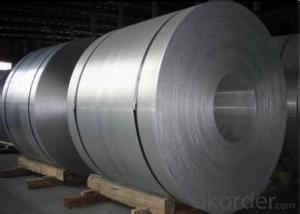Menards Aluminum Coil - Color Coated Brushed Aluminum Coils 2mm - 4mm
- Loading Port:
- Shanghai
- Payment Terms:
- TT OR LC
- Min Order Qty:
- 5 m.t.
- Supply Capability:
- 10000 m.t./month
OKorder Service Pledge
OKorder Financial Service
You Might Also Like
Specification
1. Specification of Color Coated Brushed Aluminum Coils 2mm - 4mm
Thickness | 0.1mm-10mm |
Popular Thickness | 0.1mm/0.2mm/0.25mm/0.3mm/0.6mm/0.8mm/1.0mm/1.2mm/1.5mm/2.0mm/3.0mm... |
Width | 20mm-2500mm |
inner diameter | 505mm 508mm 605mm |
Material | 1050,1060,1070,1100,1200,3003,3004,3005,5052,5005,5754,5083 |
Temper | O,H12,H14,H16,H18,H22,H24,H26,H32,H34,H36,H38,H111,H112 |
Surface | mill finish |
Packing | Export standard wooden pallets |
Payment Terms | 100% irrevocable L/C at sight or 30% T/T in advance as deposit,70% balance against the B/L copy |
Minimum Order Quantity | 5000kg |
Delivery time | 15-25 days after receiving L/C or deposit |
Remark | Specific requirement of alloy grade, temper or specification can be discussed at your request |
2. Application of Color Coated Brushed Aluminum Coils 2mm - 4mm
(1).Interior: wall cladding, ceilings, bathrooms, kitchens and balconies, shutters, doors...
(2).Exterior: wall cladding, facades, roofing, canopies, tunnels,column covers , renovations...
(3).Advertisement: display platforms, signboards, fascia, shop fronts...
3. Feature of Color Coated Brushed Aluminum Coils 2mm - 4mm
*Such coil is specially designed to replace aluminum ingot, due to the high export tax of aluminum ingot, the coil has better price than ingot.
*This type of coil can fit customer's remelting furnace just like ingot, no need to make any change to the production line that was previously used for ingot. The standard coil size and weight is very suitable for the feed gate of furnace.
*This type of coil causes less material wastage than ingot when remelted.
*Our coil is made directly from ore, no need to go though the ingot making process, quality is much better than other suppliers who use ingot scrap to make coil.
Be free from Oil Stain, Dent, Inclusion, Scratches, Stain, Oxide Dicoloration, Breaks, Corrosion, Roll Marks, Dirt Streaks and other defect which will interfere with use
4. Certificate:
SGS and ROHS(if client request, paid by client), MTC(plant provided), Certificate of Origin(FORM A, FORM E, CO), Bureau Veritas and SGS (if client request, paid by client), CIQS certificate
5. Image of Color Coated Brushed Aluminum Coils 2mm - 4mm
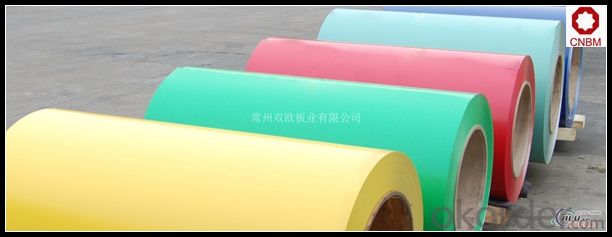
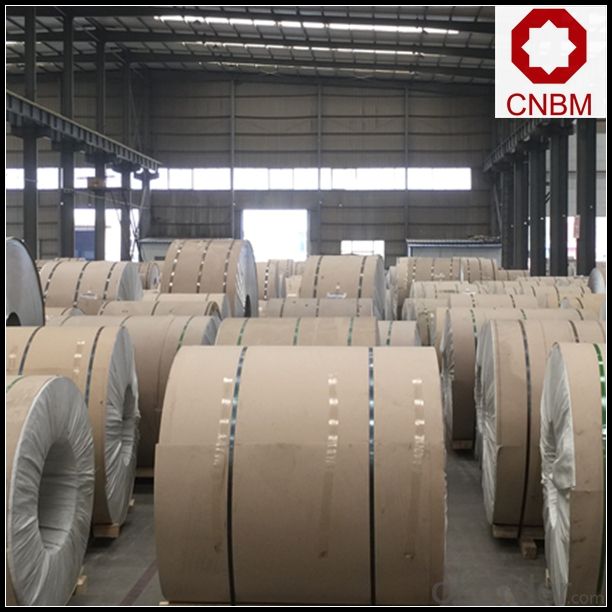
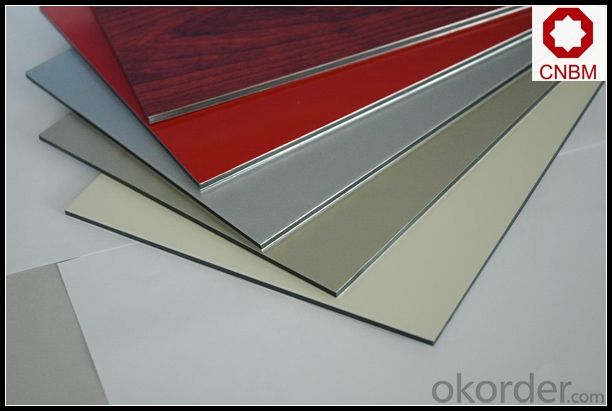
6. Package and shipping of Color Coated Brushed Aluminum Coils 2mm - 4mm
eye to wall
eye to the wall
with wood pallet (wooded case also available)
7. FAQ
1) What is the delivery time?
Dpends on actual order, around 20 to 35 days
2)What is the QC system:
We have QC staff of 20 persons and advanced equipment, each production is with MTC traced from Aluminum ingot lot.
3) What market do you mainly sell to?
Australia, America, Asia, Middle East, Western Europe, Africa etc
- Q: Are there any limitations on the coil flatness of aluminum coils?
- Yes, there are limitations on the coil flatness of aluminum coils. The flatness is influenced by factors such as the thickness, temper, and alloy of the aluminum, as well as the manufacturing process. While manufacturers strive for optimal flatness, it is important to note that perfect flatness is difficult to achieve.
- Q: How do aluminum coils contribute to energy-efficient lighting installations?
- Aluminum coils contribute to energy-efficient lighting installations by providing excellent thermal conductivity, which helps dissipate heat efficiently. This reduces the energy consumed by the lighting system and extends the lifespan of the bulbs. Additionally, aluminum coils are lightweight, durable, and corrosion-resistant, making them suitable for various lighting applications.
- Q: How are aluminum coils protected against oxidation during storage?
- Aluminum coils are protected against oxidation during storage by applying a thin layer of protective coating or by storing them in a controlled environment, such as a dry and moisture-free area. This prevents exposure to oxygen and moisture, which are the main factors contributing to oxidation.
- Q: Explain how the use of aluminum coils impacts the welding speed and efficiency.
- <p>Aluminum coils can significantly affect welding speed and efficiency due to their thermal conductivity and melting point. Aluminum's high thermal conductivity means it dissipates heat quickly, which can slow down the welding process as more energy is required to maintain the necessary heat for fusion. Additionally, aluminum's lower melting point compared to steel can lead to faster melting, potentially increasing welding speed but also requiring more precise control to prevent overheating and defects. The use of aluminum coils can also influence efficiency through the type of welding process used; for example, TIG welding is often preferred for aluminum due to its ability to provide precise heat control, which can enhance both speed and quality of the weld.</p>
- Q: How are aluminum coils used in the production of air ducts?
- Aluminum coils are commonly used in the production of air ducts as they offer superior heat transfer and corrosion resistance properties. These coils are typically formed into a specific shape and size, allowing for efficient airflow and distribution of air throughout the duct system. The aluminum material is lightweight, making it easier to handle during installation, and its durability ensures a long lifespan for the air ducts. Additionally, the coils can be easily customized to meet specific requirements, such as insulation or noise reduction. Overall, aluminum coils play a crucial role in the manufacturing of air ducts, contributing to their functionality, efficiency, and longevity.
- Q: Is it possible to use an aluminum coil as a wire in electronic devices?
- <p>While it is technically possible to use an aluminum coil as a wire for electronic equipment, it is not typically recommended. Aluminum has a higher resistivity than copper, which is the standard material for electrical wiring due to its lower resistivity and higher conductivity. This means aluminum wire may not conduct electricity as efficiently, leading to increased energy loss and potential overheating. Additionally, aluminum can oxidize, which may further degrade its conductivity over time. For most electronic equipment, copper wire is preferred for its superior electrical properties and reliability.</p>
- Q: What are the common joining techniques used for aluminum coils?
- Aluminum coils can be joined using various techniques, including welding, adhesive bonding, mechanical fastening, and soldering. When it comes to joining aluminum coils, welding is a widely used technique. Different welding methods, such as gas tungsten arc welding (GTAW or TIG), gas metal arc welding (GMAW or MIG), and laser welding, can be employed. These methods fuse the aluminum coils together, providing a strong and durable joint that ensures structural integrity. Another technique for joining aluminum coils is adhesive bonding. This method involves applying a suitable adhesive or bonding agent to join the coils. Adhesive bonding offers excellent flexibility, allowing for the joining of dissimilar materials and creating a smooth, aesthetically pleasing surface. It also distributes stress evenly across the joint, reducing the risk of fatigue failure. Mechanical fastening is another option for joining aluminum coils. This technique utilizes mechanical elements like bolts, screws, rivets, or clips. It is a relatively simple and cost-effective method, allowing for easy disassembly if needed. Mechanical fasteners provide good strength and stability, although periodic maintenance may be required to prevent loosening over time. Soldering is a low-temperature alloy-based technique for joining aluminum coils. It involves heating the solder to its melting point and allowing it to flow into the joint, creating a strong bond. Soldering is commonly used for electrical connections or delicate applications where excessive heat can damage the aluminum. However, it may not offer the same level of strength as welding or mechanical fastening. The choice of joining technique for aluminum coils depends on various factors, including specific application requirements, desired strength, appearance, and cost considerations.
- Q: What are the potential applications of coil-stucco aluminum coils?
- Coil-stucco aluminum coils have various potential applications due to their unique properties. They are commonly used in the construction industry for roofing, siding, and facades, as their stucco surface provides enhanced durability and weather resistance. These coils are also used in the manufacturing of appliances, such as refrigerators and ovens, as well as in the automotive industry for trim and decorative purposes. Furthermore, coil-stucco aluminum coils can be utilized in the packaging industry for containers and cans due to their lightweight and corrosion-resistant nature.
- Q: Can a rolling machine be utilized to transform aluminum coils into flat sheets?
- <p>Yes, you can use a rolling machine to roll aluminum coils into sheets. Rolling machines are specifically designed to apply pressure and reduce the thickness of metal coils, such as aluminum, into thinner, flatter sheets. The process involves passing the aluminum coil through the rolling mill, where it is compressed between rollers. This process can be repeated to achieve the desired thickness and flatness of the aluminum sheet. It's important to ensure the rolling machine is suitable for aluminum and that the appropriate settings are used to avoid damaging the material or the machine.</p>
- Q: How are aluminum coils protected against moisture during storage?
- Aluminum coils are typically protected against moisture during storage through the use of various methods and materials. One common method is the application of a protective coating, such as a thin layer of oil or a corrosion-resistant film, which forms a barrier between the coil and any moisture present in the environment. This coating helps to prevent direct contact between the aluminum surface and water, minimizing the risk of corrosion or other moisture-related damage. In addition to protective coatings, aluminum coils may also be stored in a controlled environment with low humidity levels. This can be achieved by storing the coils in a dry warehouse or using dehumidifiers to remove excess moisture from the storage area. By controlling the humidity, the risk of moisture condensation on the coils is reduced, further protecting them from potential damage. Furthermore, proper packaging is crucial in protecting aluminum coils against moisture during storage. Coils are often wrapped in moisture-resistant materials, such as plastic or moisture-proof paper, to create a barrier that prevents moisture from reaching the coils. Additionally, the packaging is often sealed to provide an airtight environment, further minimizing the chances of moisture ingress. Regular inspection and maintenance are also important to ensure the continued protection of aluminum coils during storage. This includes checking the integrity of the protective coatings, monitoring the storage environment for any changes in humidity levels, and promptly addressing any signs of moisture damage. Overall, the use of protective coatings, controlled storage environments, proper packaging, and regular maintenance are key factors in protecting aluminum coils against moisture during storage. By implementing these measures, the risk of moisture-related damage is significantly reduced, ensuring the quality and integrity of the coils until they are ready for use.
Send your message to us
Menards Aluminum Coil - Color Coated Brushed Aluminum Coils 2mm - 4mm
- Loading Port:
- Shanghai
- Payment Terms:
- TT OR LC
- Min Order Qty:
- 5 m.t.
- Supply Capability:
- 10000 m.t./month
OKorder Service Pledge
OKorder Financial Service
Similar products
Hot products
Hot Searches
Related keywords
